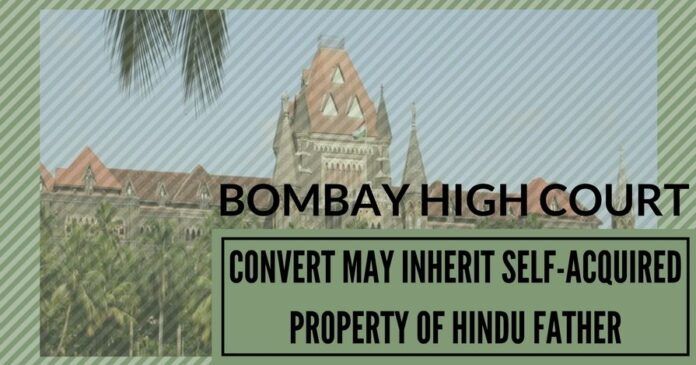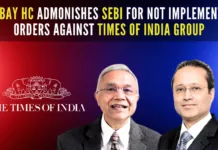
The Bombay High Court was faced with one main question- whether or not does the Hindu Succession Act apply to a person converted to another religion?
In a recently pronounced judgment in the case of Balchand Jairadas Lalwant vs. Nazneen Khalid Qureshi, the Bombay High Court has held that a person who renounces the Hindu religion and converts to another religion would still be entitled to inherit his/her father’s self-acquired property, if the father died intestate i.e. without making a will.
At the outset, it is worthy to note that a person may inherit the self-acquired property of his/her Hindu father, who died intestate or without making a will, by virtue of and in accordance with the provisions of the Hindu Succession Act (hereinafter referred to as the ‘Act’ for the sake of brevity).
Since it is by virtue of the Act that property may devolve upon a person, it is obvious that non-applicability of the Act would render a person incapable of inheriting such property.
The Bombay High Court, however, held that for the purposes of Section 2 of the Act, a person’s religionat the time of birth ought to be taken into account.
The Bombay High Court was, therefore, faced with one main question– whether or not does the Hindu Succession Act apply to a person converted to another religion?
Section 2 of the Act, which deals with the application of the Act, lays down that the Act applies to any person who is a Hindu, Buddhist, Jaina or Sikh by religion and to any other person who is not a Muslim, Christian, Parsi or Jew by religion.
It would, thus, appear the Act would not apply to a person who ceases to be a Hindu on account of having converted to another religion and so no property would devolve upon such a person under the scheme of the Act.
The Bombay High Court, however, held that for the purposes of Section 2 of the Act, a person’s religion at the time of birth ought to be taken into account. The Court reasoned that a son or a daughter acquires a right of inheritance as regards the father’s self-acquired property by virtue of his or her birth itself. The Act would, therefore, also apply to persons who have left the Hindu fold and have adopted another religion.
Additionally, the Court also drew sustenance from Section 26 of the Act in support of its view. Section 26 of the Act, which is in the nature of a disqualification clause, shuts out the descendants of a convert from inheriting self-acquired property under the Act, but omits any reference to the convert himself/herself. The Court reasoned that the said omission was intentional on the part of the legislature and indicative of the fact that a convert was never meant to be denied the right to inherit self-acquired property of a father, who died intestate, in the first place.
Lastly, the Bombay High Court also placed reliance upon a judgment delivered by the Gujarat High Court in the case of Nayanaben Firozkhan Pathan @ Nasimbanu Firozkhan Pathan vs Patel Shantaben Bhikhabai and others. In the said case, the Gujarat High Court noted that change of religion has ceased to be a ground for forfeiture of property or exclusion of inheritance in view of Section 1 of the Caste Disabilities Act, 1850. Consequently, a Hindu converted to another religion does not lose the right to inherit property under the Act.
With the greatest of respect to the Bombay High Court, I find myself unable to agree with the aforesaid view.
First and foremost, the proposition that a person acquires a right to inheritance as regards the father’s self-acquired property by the very factum of birth, which the Bombay High Court has relied upon to hold that a person’s religion at the time of birth has to be taken into account to determine the applicability of the Act, does not appear to be in consonance with the position hitherto taken by the courts of this country.
The father of the joint Hindu family governed by Mitakshara law has full and uncontrolled powers of disposition over his self-acquired immovable property.
The law is fairly settled that under Hindu Law, a son or a daughter acquires no right or interest in self-acquired property of the father simply by virtue of birth. A right or interest in self-acquired property accrues to one only upon the demise of the father, provided the latter died intestate or without making a will. A son or a daughter has, at best, a chance of succession or spes successionis, no vested right of succession to father’s self-acquired property.
Reliance is placed upon observations of a full bench of the Madras High Court, in the case of Viravan Chettiar vs. Srinivasachariar, reported in [AIR 1921 (Vol.8) Madras 168]:
“A contention was raised during the course of the argument before the Privy Council in Raja Chelikani Venkayamma v. Raja Chelikani Venkataramayyamma (1902) that sons acquire a right by birth in the father’s self-acquired property. Lord Macnaghten stated that he did not quite understand what that right was and observed ‘He is his father’s son, and if his father does not dispose of it, it will come to him; but is it anything more than a spes?’
So far as a father’s self-acquisitions are concerned, the son, though undivided, has only a spes successionis and he stands in relation to that property in the same position as an heir under Hindu Law.”
Reliance is also placed upon observations of the Supreme Court in the case of C.N. Arunachal Mudaliar vs. C.A. Muruganatha Mudaliar, reported in [AIR 1953 SC 495]:
“It was held, therefore, that the father of the joint Hindu family governed by Mitakshara law has full and uncontrolled powers of disposition over his self-acquired immovable property and his male issue could not interfere with these rights in any way. This statement of the law has never been challenged since then and, it has been held by the various High Courts in India, and in our opinion rightly, that a Mitakshara father is not only competent to sell his self-acquired immovable property to a stranger without the concurrence of his sons, but he can make a gift of such property to one of his own sons to the detriment of another; and he can make even an unequal distribution amongst his heirs.
So far the law seems to be fairly settled and there is no room for controversy”.
In view of the aforesaid, it is clear that no person acquires a right or an interest in the self-acquired property of his or her father by birth. Thus, the very foundation whereupon the edifice of the judgment pronounced by the Bombay High Court stood is taken away.
Moreover, a logical outcome of the above noted proposition would be that since a right or interest in self-acquired property of the father would devolve only upon the demise of the latter, the religion of the son or daughter at the time of the demise of father and not at the time of birth ought to be taken into account to determine the applicability of the Act.
The Act would, therefore, clearly not apply to a person who had converted to another religion prior to the demise of his or her father and had not reconverted back to Hindu religion at the time succession opened.
Secondly, in so far as Section 26 of the Act is concerned, the same does not warrant any inference in the favour of a convert. The fact that the said provision disqualifies descendants of a convert but omits any reference to the convert himself/herself, cannot ipso facto lead to the conclusion that a convert can inherit property under the scheme of the Act, when Section 2(1) (c) of the Act envisages an express bar to the applicability of the Act to persons who are Muslims, Christians, Jews or Parsis.
The express mandate of the application clause of the statute cannot be undone simply because a convert does not attract the disqualification contemplated under Section 26 of the Act. The intention of the legislature, in the first instance, has to be ascertained from the words used in the statute. The words used in the Act clearly bar its applicability to Muslims, Christians, Parsis or Jews. Section 26 of the Act does not in any way run counter to the Section 2 (1) (c) of the Act, but concerns a separate issue altogether, and therefore cannot be overly relied upon to detract from or undermine the express language of Section 2 (1) (c).
A thought must also be spared to the Gujarat High Court judgment, which notes that change of religion has ceased to be a ground for forfeiture.
At this juncture, it would be useful to cite the judgment delivered by the Andhra Pradesh High Court in the case of Jujjavarapu Yesurao vs Nadakuduru Kamal Kumar and others, reported in [2007 (5) ALD 140], wherein the question as to who are the persons to whom the Act applies fell for consideration. The Andhra Pradesh High Court answered the aforesaid question thus:
“Who are the persons to whom Succession Act applies? Explanation to Section 2(1) read with Clauses (a), (b) and (k) of Section 2(1) of Succession Act contains categories of persons to whom Succession Act applies by reason of such persons being Hindus. Section 2(1)(c) of the Succession Act contains categories of persons to whom Succession Act does not apply by reason of such persons not being Hindus, to whom Hindu Law of Custom and Usage had never been applied before the enactment of Succession Act. To clarify further, Section 2(1)(c) of Succession Act lays down that the Act applies to any other person (who is not Hindu) to whom Hindu Law of custom and usage was applied prior to Succession Act. It also lays down that Succession Act does not apply to a person who is a Muslim, Christian, Parsi or Jew. In other words, Succession Act applies to any other person, who is not a Hindu but was governed by Hindu Law before the enactment of Succession Act but such person should not be a Muslim, Christian, Parsi or Jew.”
Interestingly, the above-noted judgment of the Andhra Pradesh High Court was cited before the Bombay High Court but was ignored on the ground that the facts, in that case, were different from the case which the Court was seized of. With all due respect to the Bombay High Court, the above-noted observations of the Andhra Pradesh High Court are not specific to a set of facts but are purely legal in nature, and, therefore, could not have been overlooked on the ground that the facts in the two cases were different.
Be that as it may, it is clear as daylight that the Act does not apply to converts to another religion.
Last but not the least, a thought must also be spared to the Gujarat High Court judgment, which notes that change of religion has ceased to be a ground for forfeiture of property or exclusion of inheritance in view of Section 1 of the Caste Disabilities Act, 1850, and whereupon a great deal of reliance has been placed by the Bombay High Court.
With the utmost respect to the Gujarat High Court, I dare say, the law laid down by the Court does not appear to be without fault.
Section 4 (b) of the Hindu Succession Act invests the Act with an overriding effect and provides that any other law in force before the commencement of the Act shall cease to apply to Hindus in so far as it is inconsistent with the provisions of the Act. Therefore, in plain and simple words, a disability imposed upon a convert by the Act itself could not have been overridden by invoking the Caste Disabilities Act, which was clearly enacted prior to the Hindu Succession Act and thereby ceased to be of any consequence in cases of inconsistency.
For reasons stated hereinabove, I can’t help but respectfully disagree with the view taken by the Bombay High Court. Though the anxiety of the Court to place a just and equitable interpretation upon the provisions of a statute in the hope to do justice is perfectly understandable, yet the powers of interpretation cannot be resorted to circumvent clearly worded provisions of law.
Note:
1. The views expressed here are those of the author and do not necessarily represent or reflect the views of PGurus.
- Election Commission of India – Treading on thin Ice - May 22, 2019
- Rahul Gandhi’s Citizenship – The Centre Must Decide - April 23, 2019
- Bombay High Court- Convert may inherit self-acquired property of Hindu father - March 30, 2018











This judgement is going to carry dangerous implications and the evil abrahamic minority faiths are going to take advantage of it.
A common person doesn’t have a suitable background to understand this issue. Some apex Hindu body needs to take this up. I am wondering if any of the rich Hindu temples supports/funds a team of lawyers to handle these issues. What about other religions?
If there is a Hindu succession act, there must be a body to defend cases relating to that act. Period.
Shocking anti – Hindu judgements appear to be the rage from our honourable corrupt judiciary! God help Hindus!!
With due respect disagree with the judgement, it will increase many more litigation among the families whose one of the member converted and further claim to inherit father’s self acquired property.